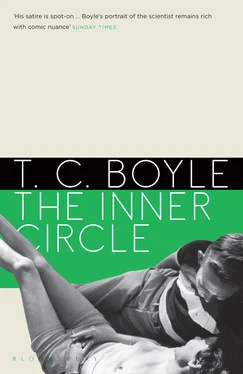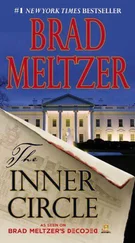Most of the guests had already arrived by the time we got there. I suppose there must have been fifteen or twenty people present, professors and their wives, Prok’s next-door neighbor, two awed-looking undergraduates who seemed afraid even to glance at the crackers, nuts and chocolates Prok had set out around the room in cut-glass dishes. Mac greeted us at the door. “John,” she puffed in her airless voice, drawing me to her for a kiss on the cheek, “and, Iris, so nice of you to come,” and she took both of Iris’s hands in her own and embraced her as if they’d been separated for years.
They held on to each other just a moment longer than I thought appropriate, and I was beginning to feel uncomfortable, as if I’d been deserted there in the entrance hall, the eyes of the guests beyond already roving toward us. “But, Mac,” Iris said, fixating on her face as if they were exchanging telepathic secrets, “you know I wouldn’t miss it for the world.” She was smiling, beaming, as happy as I’d seen her since the draft notice arrived, all her irritation over Prok dissolved in that instant. She was genuine, I’ll give her that. “You’re simply the best, you are, and I — we, John and I — we’re always thrilled to come visit. You know that. I just wish we could return the favor …”
“Don’t you worry,” Mac said, taking our coats and leading us into the living room, “something’ll turn up. Prok and I went through the same sort of thing after our honeymoon, and the place we did find — well, you kids probably wouldn’t look twice at it today.”
Iris cooed something in response — I still hadn’t got round to broaching the subject of Mac with her, and I know it was ridiculous and maybe even cowardly, but I think too that anyone in a similar situation will understand the temptation to let sleeping dogs lie — and then we were among the company and Mac had excused herself to dart off to the kitchen. I didn’t know everyone there, though I’d attended several of Prok’s musicales in the past — the cast of invitees was forever shifting — and so I wasn’t able to pick out Corcoran right away. We were distracted by Professor Bouchon of the Chemistry Department, and his wife, who appeared to suffer from logorrhea, and then we were separated, and I found myself wedged into a corner and nodding at what seemed appropriate junctures as Mrs. Professor Bouchon told me in exhaustive detail of the defects of the German character and the privations she’d suffered as a girl in Nantes during the first war. Iris was across the room, clutching a long-stemmed glass of greenish liquid (one of Prok’s herbal liqueurs) and talking guardedly with Professor Bouchon and a gaunt, hunched man in a flannel suit who was too old to have been Corcoran. It was only then that I realized that Prok wasn’t among us.
But a word here on the musicales: Prok, always the inveterate collector, had amassed a personal library of over a thousand records, and for the past decade or more he’d been hosting these weekly gatherings in order to share the musical wealth. There was a high tone to these evenings, and the shape of the program was uniform and even fairly rigid — Prok was in charge, and Prok would do as Prok would. The guests gathered, as we were doing now, for a brief period of socializing, Prok delivered a lecture on the pieces and composers he’d selected, and then there was the listening. Seated in a semicircle facing the gramophone, the audience watched in silence as Prok wiped the record free of dust, sharpened the cactus needle and gently laid it on the revolving disc; this was succeeded by a moment of tense anticipation, during which the guests sat rigid and expressionless through the initial poppings and crackles until the music began with a characteristic roar and they settled into their listening postures. The records were always played at full volume, because that was the only way, Prok believed, to pick up on the nuances of the pianissimo movements and the full complexity of the interweaving of the various instruments, and for the duration of the symphony or quartet or whatever it was he’d chosen for the evening, absolute silence was required on the part of the audience. I remember one evening on which the wife of a first-time guest seemed especially restive and kept shifting in her seat, though Prok threw her one admonitory glance after another — her chair was squeaking and she couldn’t help herself. Afterward, during the break for refreshments, Prok ignored her. She was never asked back, as far as I knew.
But this evening was different, in deference to Corcoran. The preconcert gathering was more elaborate and animated than usual, as if this were a dinner party rather than a musical evening, and I was just about to excuse myself and go looking for Prok, when the door from the kitchen swung open and he strode into the room with the crystal bowl from our wedding party held out before him in both arms. Right behind him, holding the door, was Corcoran.
The first thing I noticed about Corcoran was the look on his face — not smug, exactly, but utterly relaxed and self-assured — and then the physiognomy itself. It’s been discovered (not by us, but by other researchers in the field) that the most appealing face in either sex is the one that most closely approaches perfect symmetry, and Corcoran’s certainly fit the bill. He was handsome, no two ways about it. Eyes the color of a calfskin wallet, sandy hair, the perfect expanse of brow, everything about him sleek and neat to a degree that was just pleasing, simply that. You saw him and you liked him, and when he smiled, and then when he spoke, you liked him even more. That was Corcoran: handsome, charming, gregarious. He was just slightly taller than average, five eight or nine, I guess, and he didn’t look particularly athletic — too slack, somehow, too insouciant, as if there were an invisible bellpull hanging in front of him and he had only to give it a tug to summon a whole team of servants at a trot.
In the bowl, trembling at the cut-glass rim, was a deep ochre liquid in which floated the carapaces of three or four bright emerald limes, and I recognized this immediately as Prok’s special version of Planter’s Punch (two parts dark rum to one part triple sec, orange and pineapple juice in equal proportions, squeeze of lime, dash of grenadine, to be shaken and poured over ice and garnished with an orange slice and maraschino cherry). Prok looked bemused as he set the bowl down on the coffee table, obviously still turning over in his mind some little witticism of Corcoran’s, and then his face was neutral again as he focused on the task of preparing the individual glasses of punch and handing them out to his guests. Corcoran, meanwhile, had turned to Dean Briscoe and his wife, and was already talking animatedly with them, gesturing, smiling, as slick and frictionless as a tail-walking trout, and then, even as Mrs. Professor Bouchon reminded me for the third time of how she’d subsisted entirely on turnips for a period of nine weeks in the autumn of 1917, I saw him register Iris’s presence. She was in the far corner, still engaged in conversation with Professor Bouchon and the stooped, skeletal man who was too old to be Corcoran, and I watched Corcoran’s head swivel on its axis and then fix on her.
“A toast!” Prok proclaimed, though he was holding up a nearly empty glass himself and had never before offered any alcoholic beverages of any kind — even his liqueurs — prior to a musicale. The room fell silent. “To Purvis Corcoran,” he said, raising his glass high, “a fine and a talented young man — one who is certainly not sex shy, not in the least, and who I understand just might be willing to join us in our endeavors here … that is, if we can ever manage to lure him away from the cultural and physical charms of South Bend.”
Читать дальше












